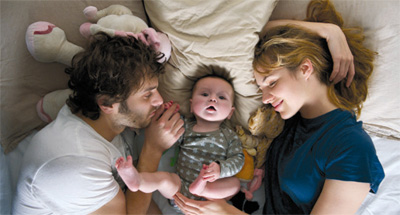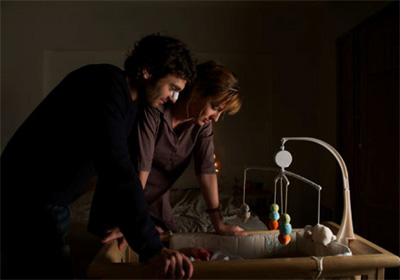Louise Bourgoin A Happy Event Interview

Louise Bourgoin A Happy Event Interview
Cast: Louise Bourgoin, Pio Marmaï, Josiane BalaskoDirector: Rémi Bezançon
Genre: Romance, Drama
Rated: MA15+
Running Time: 107 minutes
Synopsis: Barbara - intelligent, ambitious and gorgeous - is a post-graduate student, while Nicolas, replete with boyish charm, is a clerk in a video store. After a humorous courtship in the video store where Nicolas works, the pair begins a passionate romance that grows into relationship bliss. They frolic, they dine, they paint walls together and all too quickly they find themselves enthusiastically, if not slightly nervously, embarking on their biggest joint venture yet - their first child.
But what begins as a life step they decide to embrace with joyful abandon, quickly starts to change shape (both figuratively and literally) as Barbara's tummy swells with their unborn child and new pressures start to weigh on their relationship. Hormones begin to race, emotions run high and identities begin to fracture. The reality and pit-falls of child-bearing and rearing soon hits home, and despite the support of those around her, Barbara struggles to connect with her baby.
Release Date: April 12th, 2012
Interview with Louise Bourgoin
Rémi Bezançon: Louise, what were your thoughts when you first read the screenplay?Louise Bourgoin: I thought it was a project I couldn't let get away. It's a real role, a portrait of a woman, so few of which exist in movies today. Barbara is not a static character: she evolves, she is transformed, and she undergoes a genuine metamorphosis. By becoming a mother, this other-worldly intellectual is forced to change her outlook on life, she goes from metaphysics to materialism. She becomes more pragmatic and more responsible. The experience of motherhood will force her out of her habitual comfort zone and away from her philosophical concepts to confront the naked truth of life. And it will also make her aware of her own mortality. In terms of acting, it was a challenge I couldn't help but accept. And the role was a real character study for me!
Rémi Bezançon: The fact that you don't yet have a child was an advantage for me. Writing the screenplay, I used Éliette Abécassis' own experiences, and what she tells in her book was sufficiently rich. I don't think we needed another account. We may have even run the risk of a collision between the two. I don't have a child yet either, and I liked the fact that I could fantasize about it, rather than having to use my own experience. And then this is supposed to be Barbara's first child, so she too has no experience as a mother. Everything she experiences with her baby is for the first time. That's what you had to play: the fear of the unknown.
Louise Bourgoin: I was never pregnant, and so it's true, I wanted to play the part, but I was afraid to play it too. That fear never let up during the whole shoot.
Rémi Bezançon: Fear can sometimes work as a motor. It was interesting to see how you used it to shape your character.
Louise Bourgoin: I had so many doubts because of my lack of experience, that every time I ran into a pregnant woman, I harassed her with questions. I must have driven Sandrine (the make up artist, seven months pregnant during the shoot) completely crazy! The stomach pads were a big help too. The more I'm disguised, the better I can shape a character that is very different from me. That much is obvious. And the time it took to get into those phony stomachs was that much more time I could devote wholly and concretely to getting into character. I got up at dawn so they could glue the prostheses onto my pelvis and chest, and paint them to give them that real-looking flesh color. I had to stand five hours straight, because if I sat down, I might crease the latex. So I started out the day already tired, and a bit high on all those weird solvents they use in special effects make up. But that fit in well with the real state of a pregnant woman, exhausted by all those hormone changes and the heavy stomach she's lugging around. It was perfect.
Rémi Bezançon: You also told me that you had had very little to do with newborns in your life. You thought that might be a handicap for the role, whereas in fact it was a real advantage: it was important for the world of babies to be a totally new discovery for Barbara.
 Adapting to Babies
Adapting to BabiesLouise Bourgoin: I was as overwhelmed as my character. At first, I thought we'd never manage. It was hard to let myself go, when the baby in my arms was slapping me in the face, or telling me its problems in onomatopoeia. But we gradually domesticated each other. I would stay with the babies between scenes to get them used to me. I'd play with them, calm them� I even spent some Sundays with them at their parents' houses.
Rémi Bezançon: Yes, you're right, we had to adapt to the babies. They were our priority. It was funny to see a crew of fifty working to a schedule designed around naps and bottle times.
Louise Bourgoin: There were some magical moments. Like the breastfeeding scenes. I could feel the baby sucking on my breast. I didn't need to act then, I was trembling with emotion.
Rémi Bezançon: When you're writing a screenplay, you don't immediately realize the impact your words can have. And when writing those two: "Barbara breastfeeds", I didn't realize how touchy that was going to be, especially if I wanted something that looked very realistic for both the breastfeeding scenes and the childbirth scenes. The special effects crew worked miracles.
Louise Bourgoin: Childbirth is always risky in a film. It can easily become grotesque. Here it was THE scene. If we got that wrong, we got the whole film wrong, because it would no longer be credible.
The Demand of Realism
Rémi Bezançon: We were very much aware of what was at stake, so we prepared as much as we could before the shoot. With my director of photography, we filmed some real deliveries with the parents' prior authorization. We wanted to submerge ourselves in reality. We wanted to check the emotions, to work on the framing. It was very impressive and it was a big help when we filmed our own childbirth scene. By the way, you too prepared for this scene way in advance.
Louise Bourgoin: Yes, I took childbirth classes with pregnant women to learn how to breathe during the contractions. I also followed a midwife around a Paris clinic. She let me watch about ten deliveries.
It was very compelling, the blood, the secretions, the placenta... We live in a sterilized society; we're not used to seeing things like that, even though it's only natural. Anyway, I wonder whether I wouldn't prefer to have my baby without my partner present. I'd be too afraid he'd stay disgusted with me for the rest of his life! I remember that in her book, Éliette described Nicolas: "he was as horrified as if he had just come out of a horror film, with the lead role played by... his wife".
Rémi Bezançon: The fact that the midwife was present on set as a consultant, and that the role of the obstetrician was played by a real obstetrician, must have helped too�
Louise Bourgoin: Yes, their advice, their gestures and the way they looked were reassuring. What was important for me was to know how to scream, how to breathe in and out, how to suffer. Because you suffer differently, depending on how much your cervix has dilated. Shooting the childbirth took two days. Two truly intense days, lying on the delivery table, with my feet in stirrups, strapped into the prosthesis, hooked up to the tensiometer and to my mike, with a false IV in my arm, projectors in my face, the closed ambiance of the studio with all those people around me... I was hot. I was suffocating and, with all those hours of heavy breathing, I ended up in a state of hyperventilation and finally did actually pass out.
Birthing an Emotion
Rémi Bezançon: I left that shot in the film. You looked white as a sheet and said: I'm going to pass out... and so you did, you really did pass out. You made me feel like a sadist that day.
Louise Bourgoin: No! I want to reassure everyone: no actors were mistreated during the shoot. In fact, you are the very opposite of a sadist, you're a gentle, trusting director. You didn't overwhelm me with direction, you never said: you should play it this way or that, you talked about other things, about something that touched me and let me arrive at the required emotion at just the right moment - with a phrase, or just a single word. It was inspiring. And all those women who gave birth as I watched inspired me too. Watching them allowed me later to act out certain things I wouldn't have dared otherwise. Everything seemed to transpire in their eyes because, despite the pain, they all conserved a kind of dignity in front of the medical team, people they didn't know. I used that in my acting. I also thought of them when they put the baby on my chest after delivery. I expected them to be overcome with emotion, but not at all. First of all, they were exhausted, and their eyes worked more like radar trained on their baby. They checked to see if it looked healthy, if it had all its ten fingers. I played it as I had seen it. I thought that was more interesting that screaming and trotting out all the big emotions.
 Rémi Bezançon: But there was a moment when you actually did shed a tear.Do you remember?
Rémi Bezançon: But there was a moment when you actually did shed a tear.Do you remember?Louise Bourgoin: Yes, when I turned to Pio and saw him weeping, I lost it immediately. I was really moved. I thought it was so beautiful.
Rémi Bezançon: We also suggested that Pio watch some deliveries, but he didn't want to. He preferred to keep his innocence. He wanted it to look like he was seeing it for the first time.
Tricks of the Trade
Louise Bourgoin: Pio is an instinctive, physical actor, with great control over space, his body and his acting. He's very athletic; he's very healthy, solid and reassuring. He taught me lots of the tricks of the trade. For example, the scene in which I'm supposed to be completely drunk� just before shooting it, he made me spin around until I couldn't walk straight anymore.
Rémi Bezançon: That's why you walked into the wall when I said 'action'?
Louise Bourgoin: Uhh... yes. I did look completely drunk, you're right.
Rémi Bezançon: Yes, you were very credible.
Louise Bourgoin: He taught me lots of things like that. I'm very grateful. When we found out we were going to work together, we got together a lot before the shoot to rehearse, to practice with babies and to get to know each other. We were going to be doing some pretty intimate scenes together, kissing, making love, having sex. So we prepared for that intimacy. We became very close. And today Pio is like a brother to me.
Interview by Brooke Hunter
MORE
- Mission: Impossible Fallout
- Glenn Close The Wife
- Allison Chhorn Stanley's Mouth Interview
- Benicio Del Toro Sicario: Day of the Soldado
- Dame Judi Dench Tea With The Dames
- Sandra Bullock Ocean's 8
- Chris Pratt Jurassic World: Fallen Kingdom
- Claudia Sangiorgi Dalimore and Michelle Grace...
- Rachel McAdams Disobedience Interview
- Sebastián Lelio and Alessandro Nivola...
- Perri Cummings Trench Interview



